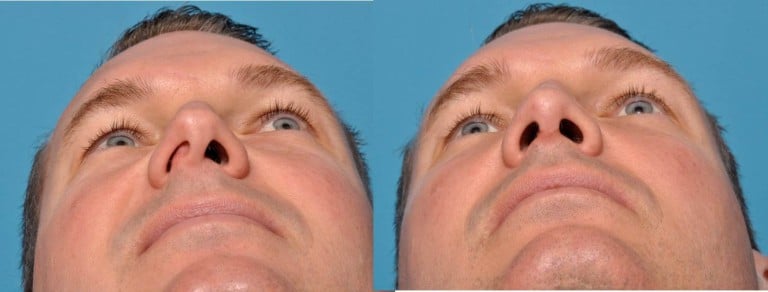
A deviated septum is a condition in which the thin piece of tissue between your nostrils (the septum) is not centered, making one nostril smaller than the other. The septum is the bone and cartilage that divides your nose in half. A deviated or displaced septum may cause snoring, nosebleeds, create difficulty breathing, and can also cause recurrent sinus infections which can be painful and even disrupt your vision.
Many people were born with their deviated septum but it can also be the result of an injury – common among those that play sports. The American Academy of Otolaryngology estimates that up to 80% of nasal septum’s are not centered and that it’s usually not noticed. A deviated septum can be diagnosed when the septum is severely off center or noticeably crooked. In some cases, treatment is not needed. For those with symptoms, nasal sprays and nasal strips can be attempted. However, surgery to correct the deviation is the most effective therapy.
Symptoms Of A Deviated Septum
Aside from having one nostril noticeably larger than the other, a deviated septum can cause difficulty of breathing. The smaller nostril may be too small to provide adequate airflow which can result in dryness and mild bleeding of the larger nostril or dry mouth from the inability to breathe through the nose. Some people with deviated septums prefer to sleep on one side in order to breathe easier and may have night-time dry mouth resulting in frequent bad breath. Snoring and sleep apnea are affected by a deviated septum. Patients with a blocked nose may be more likely to snore. In addition, a deviated septum can block drainage of the sinuses which can result in recurrent infections.
Deviated Septum and Sinus Infections
A deviated septum will not usually cause problems with pain or vision; however a sinus infection can. The symptoms of a sinus infection are facial or sinus pain, headache, nasal drip, post nasal drip, stuffiness, and fever. It can also cause infections of the orbital or eye socket and the ears. If you experience any of these symptoms, consult an ENT physician for treatment immediately. Typically, a regimen of antibiotics is prescribed to clear the infection.
Treatment for a minor and major deviated septum
Minor symptoms of a deviated septum can sometimes be treated with:
- Nasal decongestants to help clear stuffiness
- Nasal steroid sprays to decrease inflammation
- Antihistamines to prevent allergic reactions
In more extreme cases, the typical treatment for a deviated septum is surgery which is called a septoplasty. Our skilled ENT physicians straighten septums in a minimally invasive fashion by removing only the part that is crooked, thereby preserving the structure of the rest of the septum. Using state of the art endoscopic equipment and our surgical expertise, we are able to straighten your septum with no packs and minimal downtime.

When To See A Doctor
If you have a noticeable deviation of your nasal septum and you are experiencing the the symptoms we described, schedule an appointment with us immediately.







